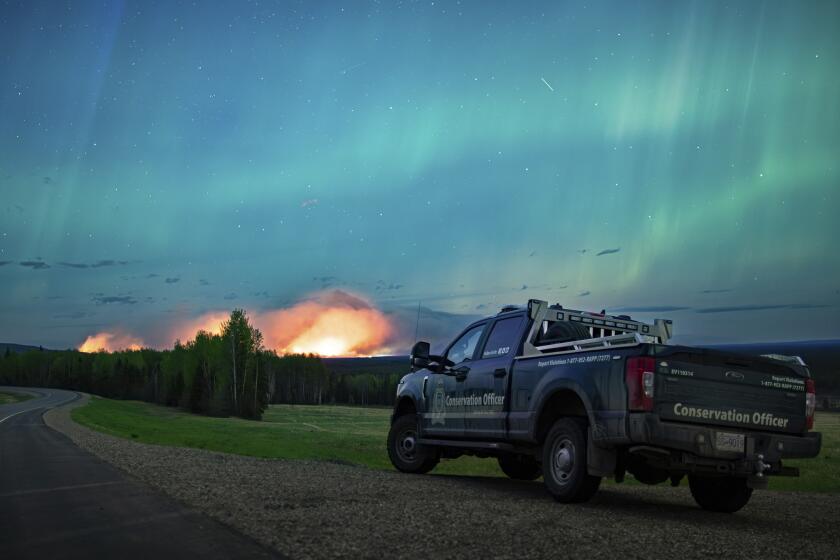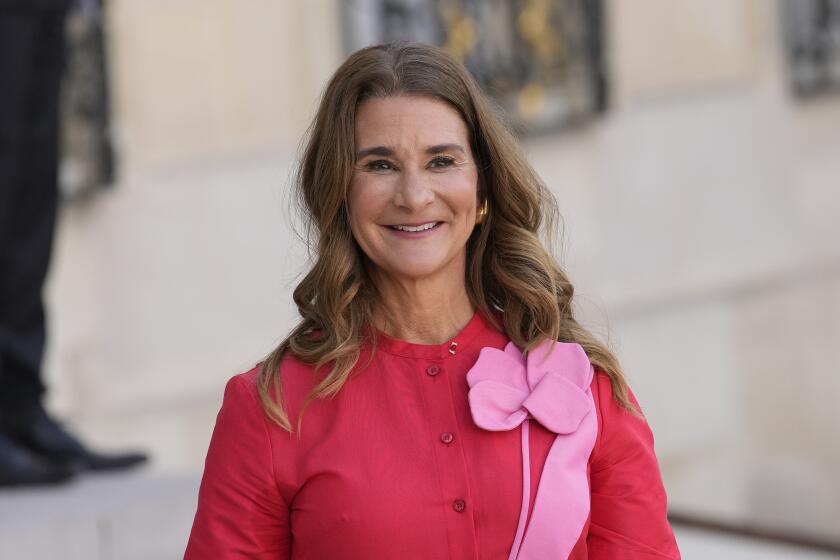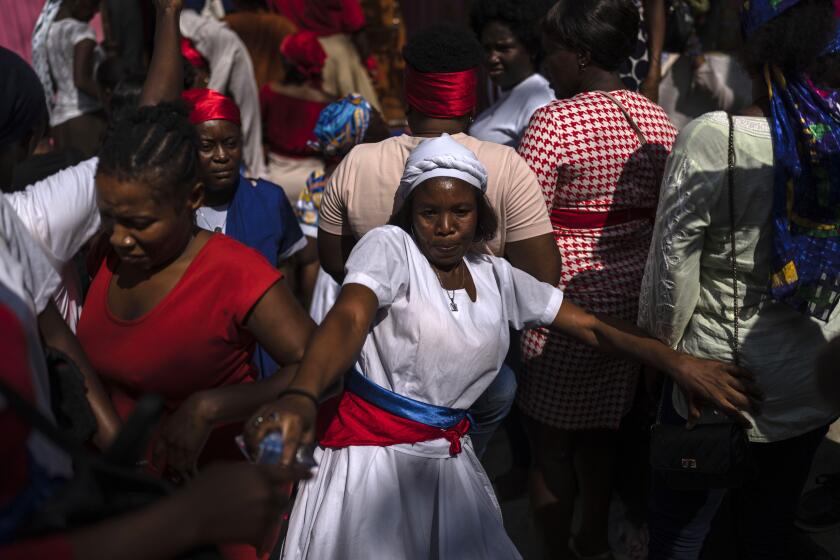Public Broadcasting Braces for a Fight : Funding: Public TV and radio officials fear a controversy reminiscent of political attacks against the arts endowment.
As criticism of public television and radio from the conservative right becomes increasingly vocal in this election year, officials in public broadcasting say they are bracing for attacks on the order of those that have been volleyed at the National Endowment for the Arts for the past several years.
“I’m prepared for it,” said John Lawson, director of national affairs for America’s Public Television Stations, public broadcasting’s lobbying arm. “I’m prepared that some people are going to want to turn this into an NEA situation.”
Public broadcasting has never enjoyed widespread support among the conservative wing of the Republican Party. Former Presidents Richard Nixon and Ronald Reagan both proposed eliminating funding for it. And President Bush has proposed freezing allocations for public broadcasting, which receives about 17% of its funding--$251 million this year for programming--from the federal government.
But recently, the debate has heated up.
* Last December, a group of unnamed Republican senators secretly moved to stall a bill authorizing $1.1 billion in funding for the Corporation for Public Broadcasting for fiscal years 1994, 1995 and 1996, by placing so-called “holds” on the legislation. While one senator, Republican Conrad Burns of Montana, has since removed his hold, an unknown number--probably no more than five, according to sources--remain.
Late Thursday, Senate Minority Leader Robert Dole (R-Kan.) refused a request from Majority Leader George Mitchell (D-Me.) to allow the bill to come to the floor for a vote. Mitchell acted to force a vote next Tuesday on whether to override Dole’s refusal and hear the bill. To succeed, Mitchell’s petition will need the backing of 60 of the 100 Senators.
* Wednesday, Republican presidential contender Patrick J. Buchanan lashed out at the Public Broadcasting Service in advertisements designed for his primary fight against Bush in Georgia. In the ads, Buchanan called the PBS documentary “Tongues Untied,” about the experiences of black gays, “pornographic and blasphemous,” and said it had been funded with tax dollars.
* Rep. Dick Armey (R-Tex.) submitted a bill in the House of Representatives earlier this month that would do away with funding for public broadcasting altogether.
‘Public broadcasting is too important in the cultural, informational and educational life of the American people to get caught up in a discussion of programs which are only a small fraction of what we have on the air,” Donald E. Ledwig, president and chief executive officer of the Corporation for Public Broadcasting, said in an interview Thursday. His agency disperses federal appropriations to individual public stations and producers.
But that’s exactly what public broadcasting’s supporters fear will happen.
A top adviser to Dole told The Times that Dole was concerned that public broadcasting was too liberal, and that Dole was supporting efforts to stall the system’s funding for that reason.
Another Dole aide, press secretary Walt Riker, decried as “speculation” worries that public broadcasting will become embroiled in the same sort of controversy that engulfed the National Endowment for the Arts during the past two years, when conservatives complained that some of its grants were funding artworks they found offensive. Last week, a day after Buchanan renewed the attack, NEA Chairman John Frohnmayer resigned--a move considered by some observers to be a concession to the right by President Bush.
But at the same time, Riker cautioned public broadcasting supporters to be prepared for a fight when the stalled authorization bill finally makes it to the Senate floor.
“Anybody who comes to Capitol Hill looking for taxpayer dollars had better be ready to have solid grounds for wanting those funds, and be ready to explain how they’re used,” Riker said Thursday. “It shouldn’t be a rubber stamp operation here.”
Sen. Burns said Thursday that he had ended his participation in the hold on the authorization bill after expressing his concern about a PBS program on cattle ranching to Marshall Turner, chairman of the board of the Corporation for Public Broadcasting.
Burns, a co-sponsor of the authorization bill, said that he had placed his hold not because he thought public broadcasting was too liberal, as others have indicated, but because he was angry that the documentary “The Range Wars,” which criticized the grazing of cattle on public lands, was aired on PBS stations during a fight over that issue in Congress.
“I’ve always been a pretty good supporter of public broadcasting, and I really didn’t have that big of a complaint,” Burns said in a telephone interview. “But when that particular program ran, my constituency, which is a lot of cattlemen and sheepmen, absolutely went through the barn roof.”
“The Range Wars” was produced by the Audubon Society, Burns said, which was actively lobbying in favor of a bill restricting grazing on public lands. At the same time, a documentary offering the rancher’s point of view was turned down by PBS, he said.
Burns’ decision to release his hold fueled speculation that he did not want to be associated with a long fight against public broadcasting. “I think Burns came forward because he is concerned that the other holders are more serious than he is, and want to turn this into another NEA situation,” said one source involved in the matter.
Burns denied knowing what the other senators were concerned about. But he said he opposed escalating the situation to an NEA-like controversy.
“I would hate to see that happen,” Burns said. “Maybe if we’ve raised a little attention (among public broadcasting officials) we can prevent anything like that from happening.”
Meanwhile, Rep. Armey, who previously has called for de-funding the National Endowment for the Arts, is arguing that if Congress stops funding public broadcasting, the federal government could save $1 billion over three years.
“It should be privatized,” said Pat Shortridge, Armey’s press secretary. “We aren’t involved in content with the NEA or public broadcasting. We’re involved in saving the taxpayers some money.”
Conservative media critic David Horowitz, who has been conducting a vigorous campaign against what he says is a leftist bias in public television programming, said that he doesn’t expect the current atmosphere to escalate into a fight on the order of the NEA controversy--as long as public broadcasting eliminates what conservatives say is bias.
“I think public-television officials are more responsive than the NEA crowd, and they will respond to legitimate concern,” Horowitz said.
“Liberals have to be more tolerant of conservatives,” he said. “That will isolate those who just want to throw mud at public television.”
According to Ledwig, the possibility of criticisms of public broadcasting being vaulted into the high-profile arena of the endowment fight would be greatly lessened if the remaining senators who are holding up the authorization bill come forward with their concerns as Burns did.
“I would hope that the senators who have concerns will call me or (CPB Chairman Turner) and ask us to come and talk about it, and if they do, we will have the same result,” Ledwig said.
Dole’s office insisted that the Republicans are too busy with the budget and other issues to make their plans known on public broadcasting, according to spokesman Riker. But if Democratic leader Mitchell succeeds in forcing the issue on Tuesday, the senators who object to hearing the bill will have to come forward.
More to Read
Start your day right
Sign up for Essential California for news, features and recommendations from the L.A. Times and beyond in your inbox six days a week.
You may occasionally receive promotional content from the Los Angeles Times.






